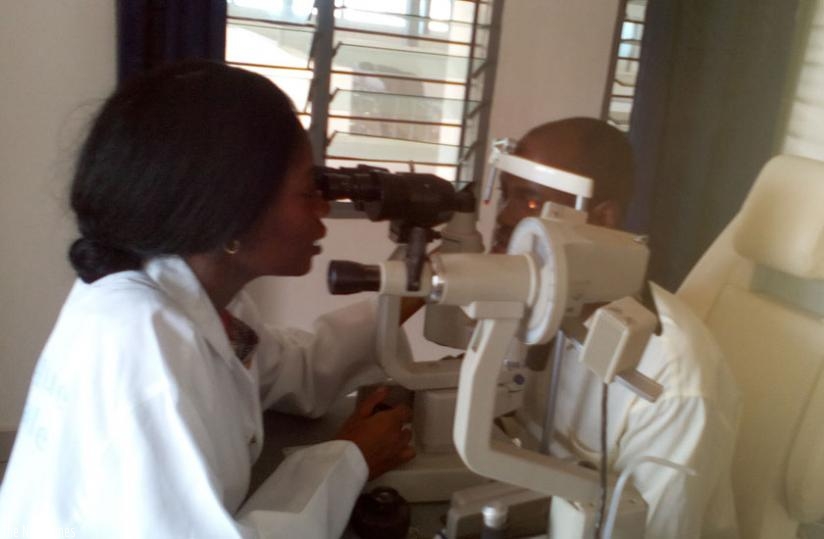Despite one having good vision, it is always essential to go for eye screening at least once a year. This is because there are many hidden eye conditions that can only be detected when diagnosed early enough.


Despite one having good vision, it is always essential to go for eye screening at least once a year. This is because there are many hidden eye conditions that can only be detected when diagnosed early enough.
According to Dr Ciku Mathege, an ophthalmologist, mostly children need eye check-ups, especially before they start school. People over the age of 40, everyone who drives and those with systemic diseases like diabetes, HIV and hypertension also need regular eye screening.
She also warns that cataract is the leading cause of blindness in Rwanda, followed by glaucoma.
How important is eye hygiene?
Sonia Sebuseruka, an ophthalmologist at Clinic La Medicale in Kigali, says maintaining good hygiene of the eyes prevents contraction of some eye diseases.
"Generally, people have a habit of touching inside their eyes, for instance, when trying to remove foreign objects stuck in the eye, which is not ideal. One should first wash their hands well with clean water before doing this,” she says, adding that this can cause infections such as redness of the eye, discharges and painful eyes.
Sebuseruka points out that one can also contract viral and fungal infections if they don’t keep their eyes clean.
Warning signs for eye problems
According to Dr Rachna Pandey, a medic at Ruhengeri Hospital, some of the symptoms of eye problems include persistent itching, redness and pain of the eye, foreign body sensation, blurred vision, coloured spots in eyes and discharge from the eyes.
Sometimes, one may just experience chronic headache due to eye problems and no other symptoms.
She advises that one should go for eye check-up if they have one or more of these symptoms. For good eye sight, one should eat a balanced diet containing a lot of vegetables and fruits.
The right glasses for your eyes
According to Dr Mathege, one is not supposed to be exposed to too much sunlight even if they don’t have eye problems.
"One can protect themselves from sunlight using good quality sunglasses, or anti-glare spectacles from the glare of computers, TV and night driving,” she says.
For Sebuseruka, not all people who have eye problems are advised to wear glasses. There are infections and diseases that can be treated only by giving the right medication.
"Mostly, glasses are given to patients who have problems with vision, especially reading. It is advisable to consult an ophthalmic technician or specialist for suitable eye glasses,” she says.
Sebuseruka adds that the optician should be able to detect any other problem like infection and astigmatism.
Astigmatism is a defect in the eye or in a lens caused by a deviation from spherical curvature, which results in distorted images, as light rays are prevented from meeting at a common focus.
"These problems would be neglected if one buys glasses directly without ophthalmic consultation first,” she says.
She advises people not to buy glasses from the market without consulting an optician, saying some of them have lenses that can cause side effects like discharges from the eyes.
Dr Pande adds that regarding sunglasses, the material should be able to block ultraviolet rays of the sun and snugly fit over eyes.
What to watch out for
Gonzalue Niyigaba, a practitioner at Polyclinique la Medicale based in Remera, advises that patients with HIV and diabetes should always pay more attention to their vision and carry out regular check-ups.
"When one is HIV-positive, with a low CD4 count, there is a high chance of them developing CMV retinitis, a disease that can lead to blindness,” he cautions.
Niyigaba further points out that patients with type 2 diabetes also stand a high chance of their vision being affected if they don’t go for check-ups.
"When diabetic patients have high blood sugar, with time it can damage some vessels in the retina (at the back of the eye), and this may lead to total blindness,” he says.
Dr Sebuseruka adds that diseases like glaucoma, which is genetic, can cause total blindness.
"Glaucoma is a disease that comes along with pressure on the eye. When the pressure increases, it can lead to the damage of the optic nerve, causing blindness,” she explains.
She says that mothers should be careful when checking the eyes for the infants, noting that if they notice a white spot on the pupil, they should seek medical advice as it may be a sign of cancer.
Dr Sebuseruka also warns against self medication, saying some medicines can aggravate corneal ulcers, which can lead to blurred vision or total blindness.
Experts warn that sharp objects should be avoided, especially for children, as they can cause trauma to the eye resulting into blindness.
When a child is born with strabismus (abnormal alignment of the eyes; the condition of having a squint) they should seek medication before they turn eight years to correct the defect.


